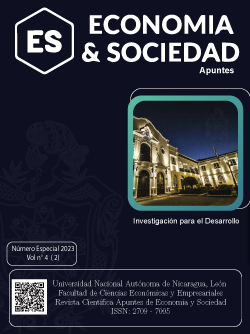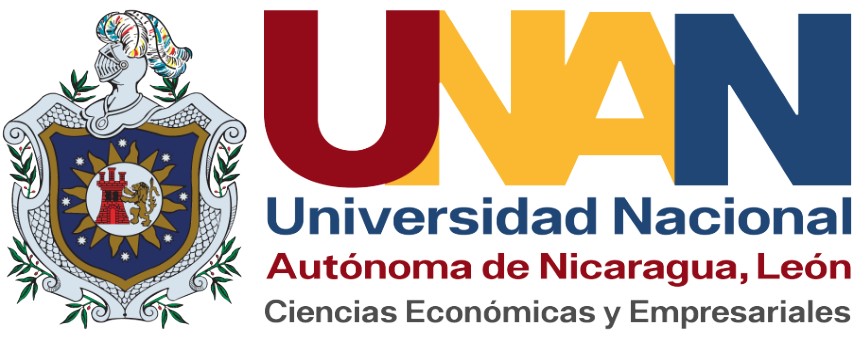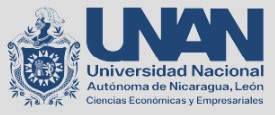Los objetivos de desarrollo sostenible en el proyecto final de estudios de ciencias del deporte
DOI:
https://doi.org/10.5377/aes.v4i2.16539Palabras clave:
formación inicial, diseño curricular, Igualdad de género, salud y bienestar, objetivos de desarrrollo sostenibleResumen
Esta investigación aporta una propuesta para la integración de los Objetivos de Desarrollo Sostenible (ODS) en el Trabajo de Final de Máster de Estudios de Actividad Física y Deporte-AFD. Asimismo, como propuesta abierta, se podría aplicar al Trabajo Final de Grado de AFD, adaptando el nivel de exigencia al nivel de estudios de Grado. En ambos casos, el objetivo es asumir la responsabilidad social de las universidades en el compromiso por un desarrollo más equitativo del conocimiento y la acción social. El diseño curricular realizado se centra en la investigación basada en el diseño como medio para integrar valores y ODS en los estudios de Ciencias de la Actividad Física y del Deporte. Esta propuesta se inserta en las innovaciones de aprendizaje e investigación en este campo del conocimiento. El diseño curricular de la asignatura nos ha permitido emprender la aventura de entrar en un aula de aprendizaje sabiendo para qué, por qué o cómo tenemos que actuar.
Descargas
Citas
Allen-Collinson, J. (2016). Breathing in life: Phenomenological perspectives on sport and exercise. En B. Smith y A. C. Sparkes (Eds), Routledge Handbook of Qualitative Research in Sport and Exercise (pp. 11-23). Routledge.
Anderson, T., & Shattuck, J. (2012). Design-Based research: a decade of progress in education research? Educational Researcher, 41(Jan/Feb.), 16-25. https://doi.org/10.3102/0013189X11428813
Atkin, A. J., Gorely, T., Biddle, S. J., Cavill, N., & Foster, C. (2011). Interventions to promote physical activity in young people conducted in the hours immediately after school: a systematic review. International Journal of Behavioral Medicine, 18(3), 176-187. https://doi.org/10.1007/s12529-010-9111-z
Ávalos, M. A., Martínez, M. A., & Urrea, M. E. (2019). Percepción del alumnado de Educación Física y de Educación Primaria sobre diferenciales de género en las aulas universitarias: estudio de caso. Revista Complutense de Educación, 30, 847-862. https://doi.org/10.5209/rced.59420
Ávalos-Ramos, M. A., Martínez Ruiz, M. A., & Merma-Molina, G. (2020). The image of physical education teachers held by students from two universities. Journal of Physical Education, 31(1), e3141. https://doi.org/10.4025/jphyseduc.v31i1.3141
Ávalos-Ramos, M. A., Martínez-Ruiz, M. A., Martínez-Benítez, J. E., & Merma-Molina, G. (2020). The international language of metaphors: a case study of higher education students in sport and physical activity in Ecuador and Spain. Revista Iberoamericana de Psicología del Ejercicio y el Deporte, 15(1), 61-66. http://hdl.handle.net/10045/103851
Ayvazo, S., Ward, P., & Stuhr, P. T. (2010). Teaching and assessing content knowledge in preservice physical education. Journal of Physical Education, Recreation & Dance, 81(4), 40-44. https://doi.org/10.1080/07303084.2010.10598463
Bayley, J., Wallace, L. M., & Choudhry, K. (2009). Fathers and parenting programmes: Barriers and best practice. Community Practitioner, 82(4), 28-31. https://pubmed.ncbi.nlm.nih.gov/19397081/
Bokhari, A. (2017). Universities’ social responsibility (USR) and sustainable development: A conceptual framework. SSRG International Journal of Economics and Management Studies (SSRG-IJEMS), 4(12), 8-16. https://doi.org/10.14445/23939125/IJEMS-V4I12P102
Brand, R., & Ekkekakis, P. (2018). Affective–reflective theory of physical inactivity and exercise. German Journal of Exercise and Sport Research, 48(1), 48-58. https://doi.org/10.1007/s12662-017-0477-9
Cale, L., Casey, A., & Harris, J. P. (2016). An advocacy paper for physical education and school sport. Physical Education Matters, 11(1), 18-19. https://dspace.lboro.ac.uk/2134/21871
Capranica, L., Piacentini, M. F., Halson, S., Myburgh, K., Ogasawara, E., & Millard-Stafford. M. (2013). The gender gap in sport performance: equity influences equality. International Journal of Sports Physiology and Performance, 8(1), 99-103. https://doi.org/10.1123/ijspp.8.1.99
Casey, A., & Goodyear, V. (2015). Can cooperative learning achieve the four learning outcomes of physical education? A review of literature. Quest, 67, 56-72. https://doi.org/10.1080/00336297.2014.984733
Casey, A., & MacPhail, A. (2018). Adopting a models-based approach to teaching physical education. Physical Education and Sport Pedagogy, 23(3), 294- 310.https://doi.org/10.1080/17408989.2018.1429588
Consejo Superior de Deportes. (2019). Personal directivo de las federaciones españolas. Ministerio de Cultura y Deporte. https://www.csd.gob.es/es/federaciones-y-asociaciones/federaciones-deportivas-espanolas/personal-directivo-de-las-federaciones-espanolas
Corno, L. (2011). Studying self-regulation habits. En B. Zimmerman y D. Schunk (Eds), Handbook of self-regulation of learning and performance (pp. 361-375). Routledge.
Corr, M., McSharry, J., & Murtagh, E. M. (2018). Adolescent girls’ perceptions of physical activity: a systematic review of qualitative studies. American Journal of Health Promotion, 33(5), 806-819. https://doi.org/10.1177/0890117118818747
De Varona, D. (2018). IOC is leading the way in gender equality. https://olympics.com/ioc/news/ioc-is-leading-the-way-in-gender-equality
Dijkhuis, T. B., Blaauw, F. J., Van Ittersum, M. W., Velthuijsen, H., & Aiello, M. (2018). Personalized physical activity coaching: a machine learning approach. Sensors, 18(2), 623. https://doi.org/10.3390/s18020623
Donelly, P., & Donelly, M. (2013). The London 2012 Olympics: a gender equality audit. Research Report University of Toronto. http://www.sportpolicystudies.ca
Ennis, C. D. (Ed.) (2012). Routledge handbook of physical education pedagogies. Routledge.
European Commission. (2014). Gender equality in sport. Proposal for strategic actions 2014-2020. Bruselas: European Commission. https://bit.ly/30WcKNh
Ekeland, E., Heian, F., & Hagen, K. (2005). Can exercise improve self-esteem in children and young people? A systematic review of randomised controlled trials. British Journal of Sport Medicine, 39, 792-798. http://dx.doi.org/10.1136/bjsm.2004.017707
Ekkekakis, P., & Brand, R. (2019). Affective responses to and automatic affective valuations of physical activity: Fifty years of progress on the seminal question in exercise psychology. Psychology of Sport & Exercise, 42, 130-137. https://doi.org/10.1016/j.psychsport.2018.12.018
Erion, J. M., Wosiski-Kuhn, M., Dey, A., Hao, S., Davis, C. L., Pollock, N. K., & Stranahan, A. M. (2014). Obesity elicits interleukin 1- Mediated deficits in hippocampal synaptic plasticity. The Journal of Neuroscience, 34, 2618-2631. https://doi.org/10.1523/JNEUROSCI.4200-13.2014
Franco, I., Saito, O., Vaughter, P., Whereat, J., Kanie, N., & Takemoto, K. (2019). Higher education for sustainable development: actioning the global goals in policy, curriculum, and practice. Sustainability Science, 14(6), 1621-1642. https://doi.org/10.1007/s11625-018-0628-4
Gallardo, J., González, R. M., Clemente, A. L., Santacruz, J. A., & Espada, M. (2013). Los puestos de dirección en el ámbito deportivo: revisión de las teorías y estudios sobre el caso de la mujer. Feminismo/s, 21, 91-115. URI: https://doi.org/10.14198/fem.2013.21.06
Gibson, K., & Atkinson, M. (2017). Beyond boundaries: the development and potential of ethnography in the study of Sport and Physical Culture. Cultural Studies – Critical Methodologies, 18(6), 442-452. https://doi.org/10.1177/1532708617750177
Gonzaléz, J., & Wagenaar, R. (Eds) (2003). Tuning Educational Structures in Europe. Final Report. Phase One. Universidad de Deusto. Recuperado de: http://tuningacademy.org/wp-content/uploads/2014/02/TuningEUI_Final-Report_EN.pdf
Goodyear, V. A., & Casey, A. (2015). Innovation with change: developing a community of practice to help teachers move beyond the ‘honeymoon’ of pedagogical renovation. Physical Education and Sport Pedagogy, 20(2),186-203 https://doi.org/10.1080/17408989.2013.817012
Guthold, R., Stevens, G. A, Riley, L. M., & Bull, F. C. (2018). Worldwide trends in insufficient physical activity from 2001 to 2016: a pooled analysis of 358 population-based surveys with 1.9 million participants. The Lancet Global Health, 6(10), e1077-e1086. https://doi.org/10.1016/S2214-109X(18)30357-7
Himes, C. L., & Reynolds, S. L. (2012). Effect of obesity on falls, injury, and disability. Journal of the American Geriatrics Society, 60(1), 124-129. https://doi.org/10.1111/j.1532-5415.2011.03767.x
Hockey, J., & Allen-Collinson, J. (2016). Digging in: the sociological phenomenology of ‘doing endurance’ in distance running. En W. Bridel, P. Markula y J. Denison (Eds), Endurance running: a socio-cultural examination (pp. 227-242). Routledge.
Hoeber, L., & Shaw, S. (2017). Contemporary qualitative research methods in sport management. Sport Management Review, 20(1), 4-7. https://doi.org/10.1016/j.smr.2016.11.005
International Olympic Committee (2020). Factsheet women in the Olympic Movement. https://stillmed.olympic.org/media/Document%20Library/OlympicOrg/IOC/What-We-Do/Promote-Olympism/Women-And-Sport/Boxes%20CTA/Factsheet-Women-in-the-Olympic-Movement.pdf
International Olympic Committee (2019). Statistics. Women at the Olympic Games. International Olympic Committee. https://olympics.com/ioc/news/international-olympic-committee-publishes-2019-annual-report-and-financial-statements
Jha, S. K. (2018). Narrative texts in narrative inquiry: interpretive voices to better understand experiences in given space and time. Open Journal of Leadership, 7(4), 237-249. https://doi.org/10.4236/ojl.2018.74014
Kirk, D., & Kinchin, G. (2003). Situated learning as a theoretical framework for sport education. European Physical Education Review, 9(3), 221-235. https://doi.org/10.1177/1356336X030093002
Koh, K. T., Ong, S. W., & Camiré, M. (2016). Implementation of a values training program in physical education and sport: perspectives from teachers, coaches, students, and athletes. Physical Education and Sport Pedagogy, 21(3), 295-312. https://doi.org/10.1080/17408989.2014.990369
Leal Filho, W., Shiel, C., Paço, A., Mifsud, M., Ávila, L. V., Brandli, L. L., ... & Caeiro, S. (2019). Sustainable development goals and sustainability teaching at universities: falling behind or getting ahead of the pack? Journal of Cleaner Production, 232, 285-294. https://doi.org/10.1016/j.jclepro.2019.05.309
Leeder, T. (2019) Learning to mentor in sports coaching: a design thinking approach, Sport, Education and Society, 24(2), 208-211. https://doi.org/10.1080/13573322.2018.1563403
Li, F., Chen, J., & Baker, M. (2014). University students’ attitudes toward physical education teaching. Journal of Teaching in Physical Education, 33(2), 186-212. https://doi.org/10.1123/jtpe.2012-0187
Martínez, M. A., Ávalos-Ramos, M. A., & Merma-Molina, G. (2017). Inquiring Sport and Physical Activity students’ perceptions using metaphors as research tools. Retos, 32(2), 119-123. https://doi.org/10.47197/retos.v0i32.51839
Martínez, M. A., & Sauleda, N. (2007). La investigación basada en el diseño y el diseño del crédito europeo. En M. A. Martínez y V. Carrasco (Eds.), Investigar en diseño curricular (pp. 7-22). https://dialnet.unirioja.es/servlet/articulo?codigo=1393567
Martínez-Benítez, J. E., & Sauleda-Martínez, A. (2020). Motivation and resistance as predictors of sports practice expectations: a case study of the Physical and Sports Activity students of the Central University of Ecuador. Retos, 38, 262-270. https://doi.org/10.47197/retos.v38i38.74219
Mashreghi, S. (2020). Decolonizing sport and exercise psychology within a European context a critical overview. Scandinavian Sport Studies Forum, 11, 25-42. https://sportstudies.org/wp-content/uploads/2020/05/sssf-vol-11-2020-p25-42-mashregi.pdf
Morgan, K. (2017). Reconceptualizing motivational climate in physical education and sport coaching: an interdisciplinary perspective. Quest, 69(1), 95-112. https://doi.org/10.1080/00336297.2016.1152984
Morse, J. (2020). The changing face of qualitative inquiry. International Journal of Qualitative Methods, 19(1), 1609406920909938. https://doi.org/10.1177/1609406920909938
O’Donnell, C., Sandford, R., & Parker, A. (2019). Physical education, school sport and looked-after-children: health, wellbeing and educational engagement, Sport, Education and Society, 25(6), 605-617. https://doi.org/10.1080/13573322.2019.1628731
Organización de las Naciones Unidas (2018). Informe de los Objetivos de Desarrollo Sostenible. Nueva York: Naciones Unidas. https://bit.ly/38E4KTz
Organización Naciones Unidas (2015). La Agenda para el Desarrollo Sostenible. https://www.un.org/sustainabledevelopment/es/development-agenda/
Pagani, R., & González, J. (2002). Informe técnico. El crédito europeo y el sistema educativo español. ECTS Counsellors & Diploma Supplement Promoters. Recuperado de: http://www.ugr.es/~arios/Documentos/ECTS%20Y%20EL%20SISTEMA%20ESP.%20R.%20Pagani.pdf
Pano, J. (2019). Sustainable Developmental Goals (SDGs) integration in lesson planning among pre-service teachers. CNU Journal of Higher Education, 13, 1-10. https://jhe.cnu.edu.ph/index.php/ojs3/article/view/18
Pearce, A. R., Smith, S. A., Saxton, M., & De Soto, A. (2018). Sustainability boot camp: bridging disciplines to create a sustainable future. International Journal of Construction Education and Research, 14(1), 59-73. https://doi.org/10.1080/15578771.2017.1351411
Pfister, G. (2013). Outsiders: “Female coaches intruding upon a male domain?” En G. Pfister y M. K. Sisjord (Comps.), Gender and sport. Changes and Challenges. Waxmann.
Purcell, W. M., Henriksen, H., & Spengler, J. D. (2019). Universities as the engine of transformational sustainability toward delivering the sustainable development goals. International Journal of Sustainability in Higher Education, 20(8), 1343-1357. https://doi.org/10.1108/IJSHE-02-2019-0103
Ravn, S., & Høffding, S. (2017) The promise of ‘sporting bodies’ in phenomenological thinking – how exceptional cases of practice can contribute to develop foundational phenomenological concepts. Qualitative Research in Sport, Exercise and Health, 9(1), 56-68. https://doi.org/10.1080/2159676X.2016.1187663
Rovegno, I. (2006). Situated perspectives on learning. Handbook of Physical Education, (pp. 262-274). Sage. http://dx.doi.org/10.4135/9781848608009.n15
Sanne, A. (2018). Movement perceived as chores or a source of joy: A phenomenological-hermeneutic study of physical activity and health. International Journal of Qualitative Studies on Health and Well-being, 13(1), 1516088, https://doi.org/10.1080/17482631.2018.1516088
Sawiuk, R. (2019). Mentoring in physical education and sports coaching. Sports Coaching Review, 8(2), 194-198. https://doi.org/10.1080/21640629.2017.1414428
SHAPE America. (2013). Grade-level outcomes for K-12 physical education. Reston, VA: Author. https://us.humankinetics.com/collections/shape-america-resources
Shields, N., & Synnot, A. (2016). Perceived barriers and facilitators to participation in physical activity for children with disability: a qualitative study. BMC Pediatrics, 16(1), 1-10. https://doi.org/10.1186/s12887-016-0544-7
Strachan, S. M., Marshall, S., Murray, P., Coyle, E. J., & Sonnenberg-Klein, J. (2019). Using vertically integrated projects to embed research-based education for sustainable development in undergraduate curricula. International Journal of Sustainability in Higher Education, 20(8), 1313-1328. https://doi.org/10.1108/IJSHE-10-2018-0198
Swettenham, L., Eubank, M., Won, D., & Whitehead, A. E. (2020). Investigating stress and coping during practice and competition in tennis using think aloud. International Journal of Sport and Exercise Psychology, 18(2), 218-238. https://doi.org/10.1080/1612197X.2018.1511622
Tamminen, K. A., Poucher, Z., & Povilaitis, V. (2017). The car ride home: an interpretive analysis of parent-child sport conversations. Sport, Exercise, and Performance Psychology, 6(4), 325-339. https://doi.org/10.1037/spy0000093
United Nations (UN) (2015). The Sustainable Development Goals (SDGs). https://sdgs.un.org/es/goals
United Nations Educational, Scientific and Cultural Organization (UNESCO) (2017). Education for Sustainable Development Goals. Learning objectives. France: United Nations Educational, Scientific and Cultural Organization. https://www.un.org/sustainabledevelopment/gender-equality/
United Nations Educational, Scientific and Cultural Organization (UNESCO) (2019). Atlas of gender inequality in education. http://www.unesco.org
UN Women (2016). In sport and for gender equality, One Win Leads to Another. https://www.unwomen.org/en/news/stories/2016/8/press-release-in-sport-and-for-gender-equality-one-win-leads-to-another
UN Women (2019). Women and Sport. Physical Education, Physical Activity and Sport, UNESCO 38th General Conference. https://www.unwomen.org/en/news/in-focus/women-and-sport
Vallaeys, F. (2014). University social responsibility: a mature and responsible definition. Higher Education in the World, 5, 88-96. https://www.guninetwork.org/files/ii.4_1.pdf [Consulta: julio de 2021].
Van Raalte, J., Vincent, A., & Brewer, B. (2016). Self-talk: Review and sport-specific model. Psychology of Sport and Exercise, 22, 139-148. https://doi.org/10.1016/j.psychsport.2015.08.004
Whitehead, A., Jones, H., Williams, E., Rowley, C., Quayle, L., Marchant, D., & Polman, R. (2018). Investigating the relationship between cognitions, pacing strategies and performance in 16.1 km cycling time trials using a think aloud protocol. Psychology of Sport & Exercise, 34, 95-109. https://doi.org/10.1016/j.psychsport.2017.10.001
World Health Organization -WHO (2018). Global Action Plan on Physical Activity 2018-2030. More active people for a healthier world. World Health Organization. https://apps.who.int/iris/bitstream/handle/10665/272722/9789241514187-eng.pdf?ua=1
Zeng, H. Z., Hipscher, M., & Leung, R. W. (2011). Attitudes of high school students toward physical education and their sport activity preferences. Journal of Social Sciences, 7(4), 529-537. https://doi.org/10.3844/jssp.2011.529.537
Publicado
Cómo citar
Número
Sección
Licencia
Derechos de autor 2023 Universidad Nacional Autónoma de Nicaragua, León

Esta obra está bajo una licencia internacional Creative Commons Atribución-NoComercial-CompartirIgual 4.0.














